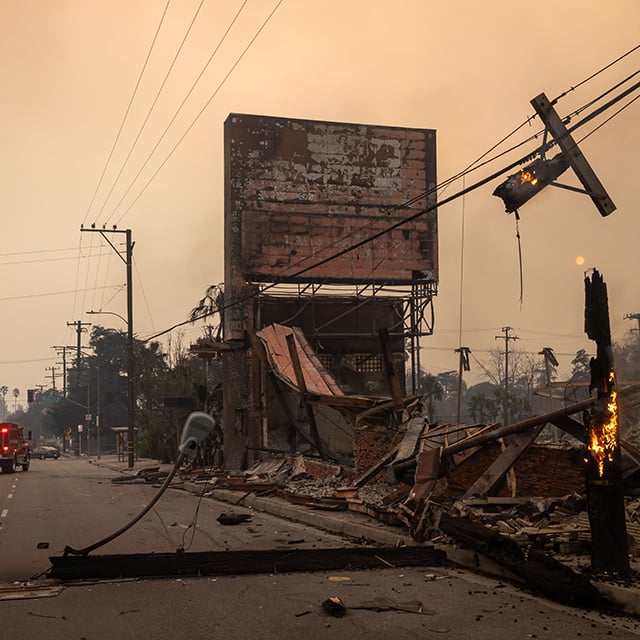Prejudice Rule Did Not Apply to Professional Liability Policy, Calif. Court Decides
A federal district court in California has decided that the notice-prejudice rule did not apply to a claims-made-and-reported professional liability insurance policy.
November 08, 2017 at 12:24 PM
6 minute read
 Edward R. Roybal federal building and U.S. courthouse.
Edward R. Roybal federal building and U.S. courthouse.
This story is reprinted with permission from FC&S Legal, the industry's only comprehensive digital resource designed for insurance coverage law professionals. Visit the website to subscribe.
A federal district court in California has decided that the notice-prejudice rule did not apply to a claims-made-and-reported professional liability insurance policy.
The Case
On Sept. 28, 2016, J.H., a minor, through his guardian ad litem, filed a personal injury lawsuit in a California state court against Celina Gonzalez, a certified nurse midwife, Stephen N. Pine, M.D. and S. Pine, a Medical Corporation (collectively, the defendants), alleging that J.H. had suffered bodily injury due to Gonzalez's professional negligence in delivering J.H.
The defendants tendered their defense to their professional liability insurer, Centurion Medical Liability Protective Risk Retention Group,Inc., 66 days later, on Jan. 18, 2017, when Pine provided a copy of the complaint to Centurion.
Centurion asked a federal district court in California to declare that it had no duty to defend the defendants in J.H.'s lawsuit given that, among other things, the defendants had notified Centurion of the lawsuit more than 20 days after it had been filed. According to Centurion, both its policy's notice requirement and late notice exclusion precluded coverage.
Centurion moved for summary judgment.
The defendants argued that although they had not reported the claim within the policy's 20-day time limit, they had reported the claim within the policy period and, as such, the notice-prejudice rule applied. According to the defendants, Centurion could disavow coverage on the basis of lack of timely notice only if it demonstrated actual prejudice from the delay.
The Centurion Policy
The Centurion policy stated:
- This underlying master policy is a claims-made policy with defense costs included within policy limits. The coverage provided by this policy is limited to those claims which arise from professional services rendered after the retroactive date stated on the declarations page and which are first made against the insured and reported to the company in writing during the policy period.
The policy also provided:
- In consideration of the payment of premium, upon compliance with all terms of this policy and subject to the specific terms, conditions and exclusions contained in this policy, and except as otherwise provided herein, the company will pay on behalf of the Insured all sums, not to exceed the policy limits, which the insured shall become legally obligated to pay as damages because of injury or death arising out of medical negligence of the insured during the policy period, for a claim when timely notice of such claim is made to the company within the policy period, and for which a judgment against the Insured is entered following an actual trial in a court of competent jurisdiction.
It defined “claim” as:
- A written notice received by an insured, and forwarded to the company, from a person or entity, alleging that such person or entity has been damaged by an insured and demanding monetary damages or notifying the insured of an intention to hold an insured responsible for an occurrence; or the filing of a civil lawsuit seeking monetary damages.
Under the heading, “Notice of Claim”, the policy stated:
- You are obligated to provide written notice of the existence of a patient's claim against you to the company promptly, and in any event not more than 20 days after receiving such claim. Notice of this claim is deemed to have been “made” to the company, for purposes of policy coverage, on the date the company first receives a written notice from you notifying the company of the claim.
The policy also stated:
- The company shall not be liable to pay or defend any claim for medical negligence against the insured for which the company does not receive written notification from you within 20 days after the insured first receives a claim as defined in Section 1.01(a) of this policy.
(Emphases added.)
The District Court's Decision
The district court granted the insurer's motion on the ground that the policy excluded coverage for claims for which it had not received written notification within 20 days after the claim was made.
In its decision, the district court pointed out that although the notice-prejudice rule had been extended to general “claims-made” policies, the Centurion policy was a “claims-made-and-reported” policy, and the notice-prejudice rule did not apply.
The district court was not persuaded by the defendants' argument that the notice-prejudice rule applied because although they had not reported the claim within the policy's 20-day time limit, they had reported the claim within the policy period. According to the district court, case law had not yet made “a distinction between a claim reported within the policy period but outside of an additionally imposed time limit, and a claim reported outside of the policy period.” The district court concluded that it found no basis for ignoring the 20-day time limit for which the parties had bargained.
The case is Centurion Medical Liability Protective Risk Retention Group v. Gonzalez, No. CV 17-01581 RGK (JCx) (C.D. Cal. Nov. 1, 2017).
Steven A. Meyerowitz is the director of FC&S Legal, the editor-in-chief of the Insurance Coverage Law Report, and the founder and president of Meyerowitz Communications Inc. As FC&S Legal director, Meyerowitz, a member of the team that conceptualized FC&S Legal, provides daily analysis and commentary on the most significant insurance coverage law decisions from courts across the country and news regarding legislative and regulatory developments. A graduate of Harvard Law School, Meyerowitz was an attorney at a prominent Wall Street law firm before founding Meyerowitz Communications Inc., a law firm marketing communications consulting company.
This content has been archived. It is available through our partners, LexisNexis® and Bloomberg Law.
To view this content, please continue to their sites.
Not a Lexis Subscriber?
Subscribe Now
Not a Bloomberg Law Subscriber?
Subscribe Now
NOT FOR REPRINT
© 2025 ALM Global, LLC, All Rights Reserved. Request academic re-use from www.copyright.com. All other uses, submit a request to [email protected]. For more information visit Asset & Logo Licensing.
You Might Like
View All
Many LA County Law Firms Remain Open, Mobilize to Support Affected Employees Amid Historic Firestorm

Legal Tech's Predictions for Artificial Intelligence in 2025

New Year, New Am Law 100: Challenges Await These Newly Merged Law Firms
7 minute readTrending Stories
- 1President-Elect Donald Trump Sentenced to Unconditional Discharge
- 2JCPenney Customer's Slip-and-Fall From Bodily Substance Suit Best Left for a Jury to Decide, Judge Rules
- 3Products Liability: The Absence of Other Similar Claims—a Defense or a Misleading Effort to Sway a Jury?
- 4529 Accounts Are Not Your Divorce Piggybank
- 5Meta Hires Litigation Strategy Chief, Tapping King & Spalding Partner Who Was Senior DOJ Official in First Trump Term
Who Got The Work
Michael G. Bongiorno, Andrew Scott Dulberg and Elizabeth E. Driscoll from Wilmer Cutler Pickering Hale and Dorr have stepped in to represent Symbotic Inc., an A.I.-enabled technology platform that focuses on increasing supply chain efficiency, and other defendants in a pending shareholder derivative lawsuit. The case, filed Oct. 2 in Massachusetts District Court by the Brown Law Firm on behalf of Stephen Austen, accuses certain officers and directors of misleading investors in regard to Symbotic's potential for margin growth by failing to disclose that the company was not equipped to timely deploy its systems or manage expenses through project delays. The case, assigned to U.S. District Judge Nathaniel M. Gorton, is 1:24-cv-12522, Austen v. Cohen et al.
Who Got The Work
Edmund Polubinski and Marie Killmond of Davis Polk & Wardwell have entered appearances for data platform software development company MongoDB and other defendants in a pending shareholder derivative lawsuit. The action, filed Oct. 7 in New York Southern District Court by the Brown Law Firm, accuses the company's directors and/or officers of falsely expressing confidence in the company’s restructuring of its sales incentive plan and downplaying the severity of decreases in its upfront commitments. The case is 1:24-cv-07594, Roy v. Ittycheria et al.
Who Got The Work
Amy O. Bruchs and Kurt F. Ellison of Michael Best & Friedrich have entered appearances for Epic Systems Corp. in a pending employment discrimination lawsuit. The suit was filed Sept. 7 in Wisconsin Western District Court by Levine Eisberner LLC and Siri & Glimstad on behalf of a project manager who claims that he was wrongfully terminated after applying for a religious exemption to the defendant's COVID-19 vaccine mandate. The case, assigned to U.S. Magistrate Judge Anita Marie Boor, is 3:24-cv-00630, Secker, Nathan v. Epic Systems Corporation.
Who Got The Work
David X. Sullivan, Thomas J. Finn and Gregory A. Hall from McCarter & English have entered appearances for Sunrun Installation Services in a pending civil rights lawsuit. The complaint was filed Sept. 4 in Connecticut District Court by attorney Robert M. Berke on behalf of former employee George Edward Steins, who was arrested and charged with employing an unregistered home improvement salesperson. The complaint alleges that had Sunrun informed the Connecticut Department of Consumer Protection that the plaintiff's employment had ended in 2017 and that he no longer held Sunrun's home improvement contractor license, he would not have been hit with charges, which were dismissed in May 2024. The case, assigned to U.S. District Judge Jeffrey A. Meyer, is 3:24-cv-01423, Steins v. Sunrun, Inc. et al.
Who Got The Work
Greenberg Traurig shareholder Joshua L. Raskin has entered an appearance for boohoo.com UK Ltd. in a pending patent infringement lawsuit. The suit, filed Sept. 3 in Texas Eastern District Court by Rozier Hardt McDonough on behalf of Alto Dynamics, asserts five patents related to an online shopping platform. The case, assigned to U.S. District Judge Rodney Gilstrap, is 2:24-cv-00719, Alto Dynamics, LLC v. boohoo.com UK Limited.
Featured Firms
Law Offices of Gary Martin Hays & Associates, P.C.
(470) 294-1674
Law Offices of Mark E. Salomone
(857) 444-6468
Smith & Hassler
(713) 739-1250






